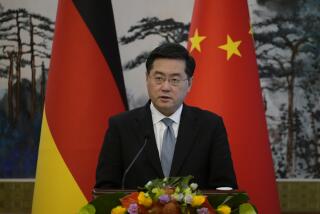Tensions between China, Japan escalate
- Share via
Reporting from Seoul and Beijing — A day after China’s premier warned that his nation would punish Japan if it did not release a detained Chinese fishing boat captain, Beijing on Thursday cut off exports of minerals to Japan that are used in such products as hybrid cars, according to a media report that was later denied by Chinese officials.
In recent days, Chinese officials have raised continuing alarm over Japan’s holding of the trawler captain, whose boat collided two weeks ago with Japanese coast guard vessels near a chain of islands in the East China Sea that are claimed by both nations.
“If Japan clings to its course, China will take further action,” Chinese Premier Wen Jiabao said during a speech to the Chinese American community in New York on Tuesday. He added that Tokyo “bears full responsibility for the situation, and it will bear all consequences.”
Wen’s comments were the first by a Chinese leader on the controversy.
As Japan reportedly prepares to put the captain on trial, Beijing has reacted angrily, this week suspending ministerial-level contacts with Tokyo. And Chinese officials said Wen would not meet with Japanese Prime Minister Naoto Kan during U.N. meetings in New York this week.
Over the weekend, protesters in Beijing rallied outside the Japanese Embassy and marched to the Foreign Ministry, belting out the Chinese national anthem and hollering nationalistic slogans to protest the captain’s prolonged detention.
As tensions worsened, a report in the New York Times on Thursday said Chinese customs officials will prevent all shipments to Japan of so-called rare earth elements used in a wide range of high-technology products, including hybrid cars, wind turbines and guided missiles.
China denied Thursday that it had banned exports of rare earth minerals to Japan. “China does not have a trade embargo on rare earth exports to Japan,” China’s Ministry of Foreign Trade and Economics Cooperation spokesman Chen Rongkai told Bloomberg news agency.
If the news report proves true, though, the move would appear to be aimed at Japan’s already ailing economy.
“There is obviously going to be significant damage to the economic relationship between the two countries because of the current diplomatic spat,” said Liu Jiangyong, professor at Tshingua University in Beijing. “Not just in one industry, either, but in the overall business relations.”
In the past, China has been accused of limiting rare earth exports to boost global prices. Chinese officials have said limits were necessary to protect the nation’s environment.
The Japanese media have reported in recent weeks that China has repeatedly rejected Japan’s requests for Beijing to consider lifting its export controls on rare earth material. Beijing has cited national security concerns and the protection of natural resources for its export restrictions. It has also argued that the export controls do not violate World Trade Organization rules.
Japan and China agreed on Aug. 28 to launch high-level meetings to discuss Beijing’s export controls on rare earth materials. On Sept. 7, visiting Japanese business leaders urged China to review its deep cuts in rare earth export quotas for the second half of the year.
Chinese officials pointed out that there are other countries that export rare earth minerals and that Japan should diversify its sources. j
john.glionna@latimes.com
Pierson reported from Beijing and Glionna reported from Seoul.
Special correspondent Kenji Hall in Tokyo contributed to this report.
More to Read
Sign up for Essential California
The most important California stories and recommendations in your inbox every morning.
You may occasionally receive promotional content from the Los Angeles Times.












